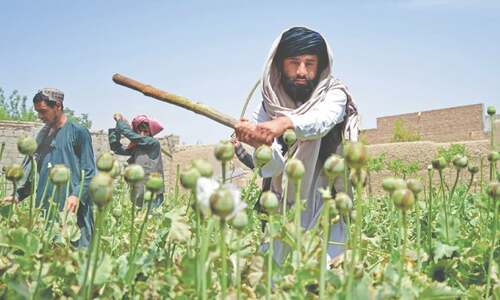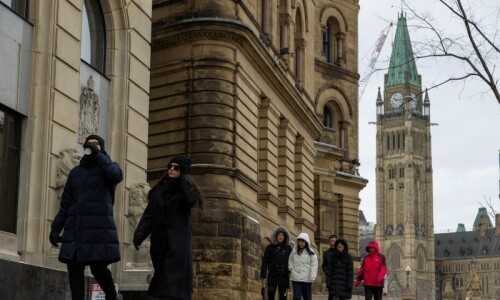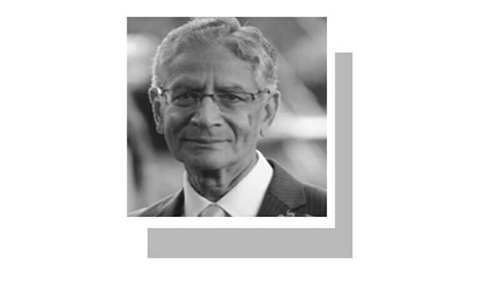ISLAMABAD: The Afghan interim government announced the formation of a committee on Sunday to probe violent clashes that left two people dead in the northeastern Badakhshan province following protests over the Taliban’s eradication of poppy fields.
The rare protests against the Taliban began on Friday in Draim district after the Taliban forces implemented a poppy cultivation ban decreed by their supreme leader, Hibatullah Akhundzada, in 2022.
One person died in Draim, one of Badakhshan’s 28 districts. Another was killed a day later when the protests spread to the nearby Argo district, according to locals.
Videos of protests posted on social media showed participants speaking against the Taliban’s actions. Draim residents alleged that Taliban forces “entered houses and insulted women” — claims denied by interior ministry spokesman Abdul Matin Qani.
The situation poses a challenge to the Taliban, as it is the first time people have staged protests in two areas.
Taliban spokesman Zabihullah Mujahid said in a statement on Sunday that the leadership has established an inquiry committee led by Qari Fasihuddin Fitrat, the Ministry of National Defence’s chief of staff. The committee is tasked with conducting a thorough investigation and reporting its findings to the prime minister’s office.
However, he blamed the protesters for the situation, accusing them of attacking security forces fighting against poppy cultivation.
Mr Mujahid later told Dawn that the situation is now under control. “The delegation has reached there (Badakhshan), and the situation has been brought under control,” he said.
Peace in Badakhshan is important for the Taliban government given its location — it shares a border with China and Pakistan’s Chitral district and is situated near Tajikistan.
Taliban officials have already announced a plan to start direct talks with China. So, peace and stability in the area are needed given the sensitivity of China, which enjoys good relations with the Taliban government but still has some security concerns.
‘Uprising’ against Taliban
Mohammed Haneef Atmar, a former Afghan foreign minister, condemned the Taliban action and said that any mistreatment, violence and oppression against the people of Badakhshan was oppression against all the people of Afghanistan.
“The current government is obliged to prevent these atrocities and obey the rights and will of the nation,” Mr Atmar, who also served as the national security adviser, wrote on X on Sunday.
Afghanistan’s former intelligence chief Rahmatullah Nabil called the protests an “uprising” against the Taliban rulers. “The general uprising of the Afghan people can be a hope to get rid of the extremism and oppression of the Taliban,” he said on X.
Taliban’s Chief of Staff Qari Fasihuddin Fitrat, in a video message, asked the local Taliban officials to stop protests. Mr Fitrat, who also belongs to Badakhshan, said the Taliban are very serious about destroying poppy cultivation.
Attaur Rehman Salim, former deputy at the High Council for National Reconciliation in Afghanistan, said the Badakhshan protest showed a gulf between the Taliban and the public. “The Taliban should take people into confidence and hold dialogue with them to resolve their problems,” Mr Salim told Dawn on Sunday.
Mansoor Ahmad Khan, Pakistan’s former ambassador to Afghanistan, noted that the Badakhshan incident reflected a dilemma for the Taliban leadership as well as the Afghan people.
“If the Taliban ignore the violations of their decree, they will be criticised by the world for being complacent or partners in the growth of opium and its trade,” Mr Khan told Dawn. “And if they remain committed to enforcing the poppy ban, it may lead to more violence.”
Published in Dawn, May 6th, 2024















































